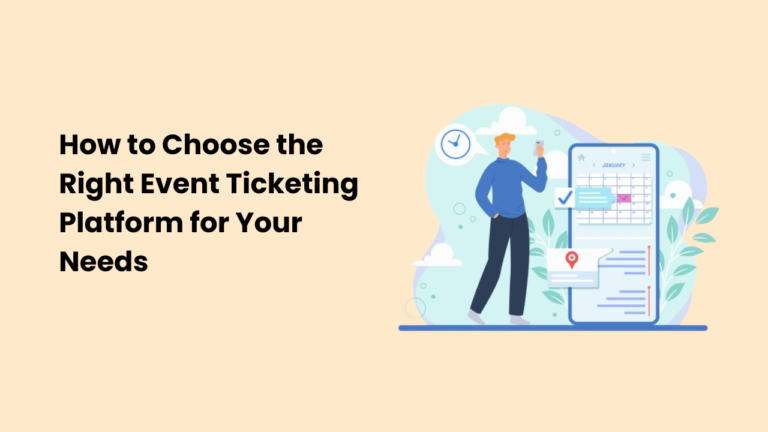When organizing an event, one of the most crucial factors is choosing the correct event ticketing platform. Whether it’s a workshop with a few attendees or a conference with hundreds, let alone a festival with thousands, having the right platform might mean the difference between a successful and unsuccessful event. A good ticketing system can facilitate ticket sales, improve the attendance experience, and help with event logistics. In this blog, we will go over some of the most crucial components of picking the finest event ticketing platform for your needs.
1. Consider Your Event Type and Size
The type and size of your event will be crucial in making the right choice when choosing the event ticketing platform. For example, bigger events like trade shows, concerts, or conferences call for advanced platforms, that can manage big crowds, multifaceted tiers of tickets, and even more complicated registration processes. Conversely, smaller, more intimate gatherings do not need all that added functionality and will get a more straightforward, cost-effective solution.
For larger B2B events, sponsorship, and interactive experiences often play a vital role in the event, so it is important to seek a platform that supports these capabilities. In addition, important features of any event management platform ought to include group event entry management tools, invaluable for managing large groups or corporate attendees.
2. User Experience and Customization
An event ticketing platform should make it easy to register for your attendees. The simpler and easy-to-use the registration procedure, the better the experience for your audience. It includes easy navigation, a clear ticket-buying procedure, and mobility compatibility, among others.
Customization is another important aspect. You would be hosting a sponsorship event, for example, where sponsors need visibility. Therefore, choose a platform that allows you to brand the ticketing pages and confirmation emails towards the event’s theme. The system should also ensure your interactive event ideas are well accomplished—where attendee interaction is of the essence—by integrating interactive tools like live polls, Q&A sessions, or gamification capabilities.
3. Pricing and Fee Structure
Understanding pricing structures and fees is essential in managing the budget of your event. The majority of event ticketing platforms typically bill fees based on the number of tickets sold, while some may charge subscription-based pricing. For smaller events, per-ticketing might be a better option to save costs, and a subscription model might be more beneficial to save long-term for larger events.
For B2B event tech partners and corporate event planners, selecting a platform with transparent pricing is key to avoiding hidden charges. Make sure to compare all costs, including transaction fees, payment processing, and any additional costs for extra features like RSVP platform capabilities or advanced reporting.
4. Payment Options and Security
A reliable event ticketing platform must support a variety of payment methods to accommodate a broad range of preferences. Consider platforms that support credit card payments, PayPal, and even mobile payment methods like Apple Pay or Google Pay. The platform must also provide secure payment processing to keep attendee information safe.
5. Event Promotion and Marketing Tools
For effective driving of ticket sales, an event ticketing platform must facilitate good promotion and marketing. Whether you need to share some sponsorship event ideas with prospective partners or promote some interesting event ideas to your crowd, the platform must support instruments that will help in making your marketing drive more successful.
6. Customer Support and Assistance
Technical issues can happen at any moment when an event is running. An effective event ticketing platform should provide customer support that understands the urgency of such matters and answers in the shortest possible time to minimize disturbances. Make sure the ticketing website offers alternative sources of support, including live chat, email, and phone.
7. Analytics and Reporting Features
Analytics become essential tools in ensuring that your event has been well-planned and executed. Proper reporting would also allow you to track the sales of tickets, revenue, and demographics in real-time, informing further improvements in your marketing strategy for future events as well as those other aspects of ticket pricing and more importantly your budgeting.
Group events require entry management platforms that report on sales of group tickets, interested attendee engagement, and entry tracking to facilitate expeditious check-in processes. At the same time, having this information will help you to make changes in real-time to ensure that things go smoothly at the event.
8. Integration with Other Tools
Your event ticketing platform should integrate well with other tools you might be using for event planning and management. For example, if you’re making use of a mobile event app for event schedules, attendee networking, or gamification, integration with your ticketing platform ensures a seamless experience for participants.
Likewise, look for platforms that integrate with CRM systems, marketing automation tools, or even event management software. If you are going to track sponsorship sales or build relationships with B2B event tech partners, integration makes it much easier to sync the data across your tools, making managing attendees while still working on really strong relationships much easier.
9. Scalability and Flexibility
Event ticketing platforms should be scalable, especially if you plan to host multiple events or expect a significant increase in ticket sales. Choose a platform that allows for easy expansion as your event grows. Whether you’re adding new ticket types or handling a larger audience, a flexible system will accommodate your evolving needs. Large interactive event ideas would need scalable infrastructure because features such as live polls or Q&A sessions often require maximum participation and need not compromise on performance.
Conclusion
Choosing the right event ticketing solution is an important decision that affects everything from ticket sales to attendee satisfaction. Knowing your event size, features required (like group event entry management or a mobile event app), and pricing models will lead you to a solution that specifically answers your needs. In addition, other tools for event promotion, customization, and integration will help facilitate an improved experience at your events.

